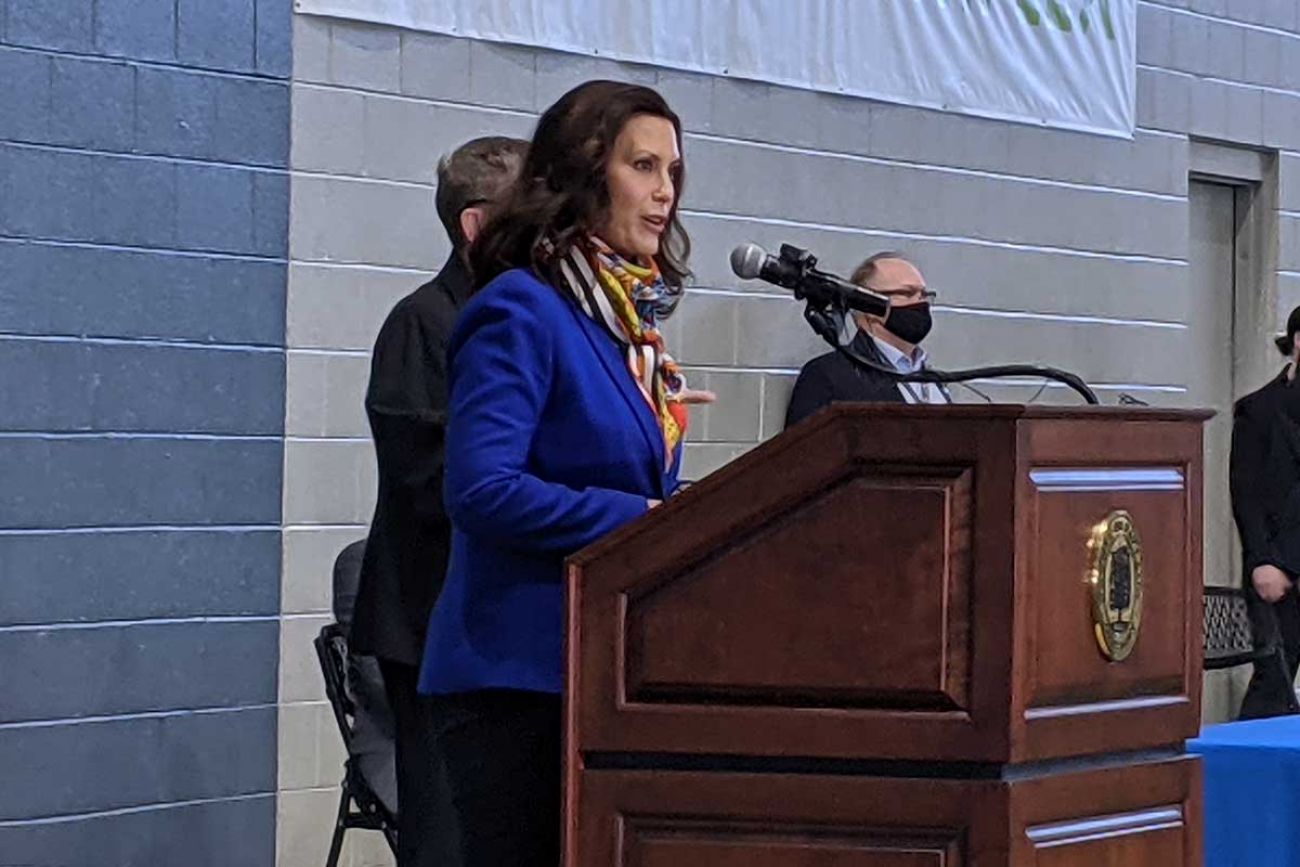Gov. Gretchen Whitmer indicates no new MI COVID restrictions are coming

April 9 update: No new restrictions, but Michigan needs help amid COVID surge, Whitmer says
April 7 update: Pressure mounts on Gretchen Whitmer to tighten Michigan COVID limits
Gov. Gretchen Whitmer said Friday that the solution to Michigan’s highest-in-the-nation COVID-19 spike rests with the state’s residents, not leaders in Lansing.
Whitmer made clear, at a mass vaccination event in Oakland County, that she has no intention of ordering new restrictions on the state’s businesses and people, as she enacted during a surge of cases in the fall. Instead, she said, residents now have more tools to avoid COVID-19: getting vaccinated and continuing to adhere to long-standing guidelines of wearing masks and keeping social distance.
Related:
- Three Michigan people who died after vaccine actually had earlier COVID
- University of Michigan postpones surgical procedures because of COVID-19 surge
- Michigan COVID hospitalizations again on the rise, but patients are younger
- Michigan school COVID outbreaks surge 47% in 2 weeks; some return to remote
- Whitmer is holding off for now on Michigan COVID limits. Here’s why.
- Michigan tops U.S. in new COVID cases. Is it variants or just our turn?
- All is forgiven, Ohio*. Thanks for the COVID vaccine. Sincerely, Michigan.
“You don't have a policy problem in Michigan,” Whitmer said of the state’s skyrocketing infections and hospitalizations. “You have a compliance, mobility and variant problem and that's why vaccines are so important.”
Michigan reported nearly 5,500 new coronavirus cases on Friday and its rate of new infections is the highest in the country as hospitals across much of the state are seeing more COVID-19 patients. The number of COVID-19 patients rose 44 percent in the past week, from 1,940 to 2,801.
But unlike in the fall, when no one had been vaccinated, more than 2.8 million state residents have had at least one dose of a COVID-19 vaccine and the state is getting more and more vaccine doses each week, creating potential firewalls against more infections.
In the past week, more than 540,000 Michigan residents received a vaccine — 14 times more than those who contracted COVID-19 in the past week. Whitmer acknowledged her concern with the latter but said her hopes rest with the former.
“We know we've got a bit of a reality check happening. We know that,” she said. “COVID is still very present and is still a very real threat. We may be seeing the light at the end of the tunnel but we are still in the tunnel and it bears repeating the best thing that we can do right now is to follow the (safety) protocols.”
In November, Whitmer’s administration ordered a three-week “pause” on indoor dining, face-to-face instruction in high schools and college and other restrictions aimed at limiting contact between people. The state cited a number of factors then, including fear that infections would intensify as families gathered for Thanksgiving and the December holidays, and that more people would be confined indoors as the weather turned colder, making it easier for the virus to spread.
The indoor-dining ban was extended twice and wasn’t eased until Feb. 1 when restaurants were allowed to open and serve up to 25 percent of their capacity. It was raised to 50 percent capacity on March 5.
But for many Republicans, the state’s remaining restrictions are still too tough. The state still caps outdoor gatherings at 25 people, indoor non-residential gatherings at 25 people wearing masks and staying six feet apart; indoor funeral services are capped at 25 people; movie theaters, casinos and bowling alleys are capped at 300 people or 50 percent of capacity, for instance.
"We've got to continue to move forward with safe openings and make sure that we continue to promote personal hygiene and pay attention to what we do," said Sen. Curt Vanderwall, R-Ludington.
The latest surge, which began in February, is worth monitoring but is not particularly surprising because the virus spread quickly last spring too, he said.
Instead of pushing for new restrictions, Vanderwall and other Republicans argue that Michigan's new surge is evidence that Whitmer administration regulations have not proven effective.
"I feel that (Whitmer’s restrictions) probably have not helped the situation," he said.
Experts at the University of Michigan and elsewhere disagree with that assessment. They say the earlier restrictions had a positive impact on reducing infections; Michigan has had one of the lowest rates of overall infections in the country.
But that also meant that hundreds of thousands of people had no immunity when the current wave hit, making those who had not yet received a vaccine more susceptible to the virus.
Until Friday, Whitmer has said relatively little recently about why she has not enacted restrictions similar to those in the fall when case rates were almost identical. She has repeatedly promoted the importance of vaccines and responsible behavior.
Whitmer also acknowledged Friday a visible reality, seen in diminished use of masks and social distancing: People are tired of the restrictions and she hinted that they might not be effective anyway because not enough people would adhere to them. That, she said, makes it more difficult for the state to reach its goal of vaccinating at least 70 percent of the population to reach herd immunity, which would help impede viral spread.
“All the best policies in the world don't do any good if people won't comply or won't … do their best to follow them,” she said. “And that's why we have to implore our friends and neighbors to get vaccinated and wear their mask,” she said. “And (that) needs to be the culture in Michigan until we hit that 70 plus percent of our (population).”
— Staff writer Jonathan Oosting contributed.
See what new members are saying about why they donated to Bridge Michigan:
- “In order for this information to be accurate and unbiased it must be underwritten by its readers, not by special interests.” - Larry S.
- “Not many other media sources report on the topics Bridge does.” - Susan B.
- “Your journalism is outstanding and rare these days.” - Mark S.
If you want to ensure the future of nonpartisan, nonprofit Michigan journalism, please become a member today. You, too, will be asked why you donated and maybe we'll feature your quote next time!




